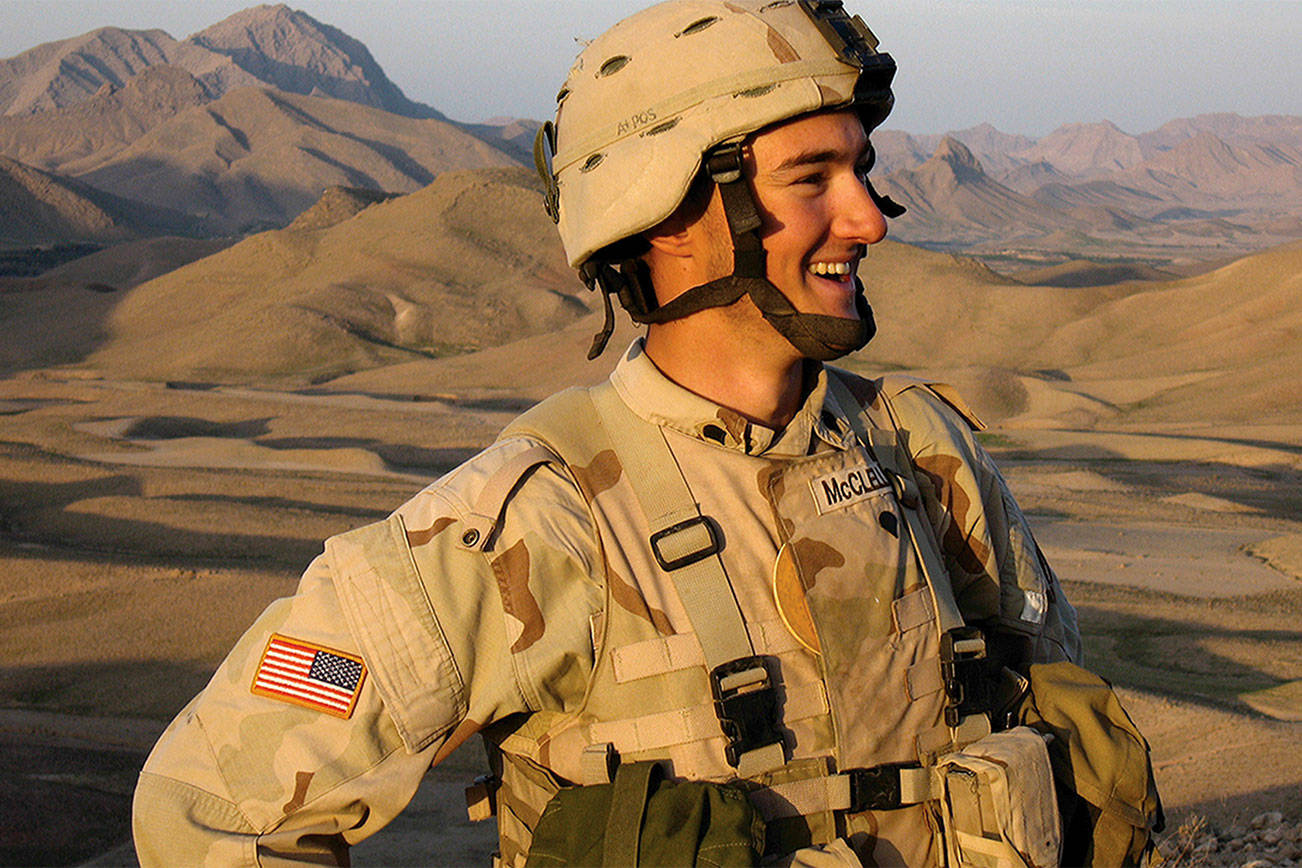When Judith Gorman and Perry McClellan mark the anniversary of the death of their son today, they’ll have a gift for him — a book titled, “A Soldier’s Journal, Last Supper to No Goodbye.”
At first glance, it appears to be the story of one young man who went off in a U.S. Army uniform to Afghanistan, only to return home where he died from the war that still raged within.
But it’s every soldier’s story, veterans have told the parents of Orrin Gorman McClellan, who killed himself May 18, 2010 in his Langley home.
“He shot himself during a flashback, I’m 100 percent sure of it,” Judith Gorman said Wednesday at the Freeland Library during a reading of a “A Soldier’s Journal” that was self published last year.
Although her son was receiving treatment for “deep invisible wounds from combat and military training,” a tragic convergence of events led him to get his gun from the safe nine years ago on that fateful May evening, she said.
Fireworks screamed in the distance, strange voices came from passersby. He’d also been drinking and playing violent first-person-shooter video games.
“That’s how it can often happen,” Gorman said.
Orrin Gorman McClellan’s complete military experience from the day before he left for boot camp to his struggles following his 2005-2006 Afghanistan deployment are chronicled in the 100-page book.
He served as a specialist in the U.S. Army with the 503rd Infantry Regiment, 173rd Airborne Brigade Combat Team, known as “The Chosen.” During combat missions, he led a mortar team.
Dozens of his stark photographs accompany powerful and poignant prose. One excerpt reads:
May 21, 2005
These are not the days of our lives.
IED injures 4.
3 will live.
2 will keep their legs.
we go where no one’s been
we look for what others run from
we fight when everyone else hides.
Orrin Gorman McClellan’s parents hope the compilation of their son’s personal writings will benefit veterans and aid families and communities to better understand the hidden emotional toll of war.
“Combat veterans have learned the secrets of war,” Gorman said.
The couple also wants to redirect the conversation about veteran suicide. It’s estimated at least 20 veterans end their own lives every day. But that statistic doesn’t include active duty military members who die by suicide nor does it count the many forms of self-inflicted deaths by veterans, such as crashing a car, confronting a cop, “falling” from a cliff.
“Focusing on suicide is not the most effective approach for decreasing the suicide rate,” Gorman said. “Suicide is not the problem, it is the result of a problem.”
She advocates raising the enlistment age from 18 to 24 because research has shown definitively that the brain and nervous system don’t fully develop in adults until about age 24.
Orrin Gorman McClellan attended the Waldorf School in South Whidbey, received private tutoring for years to learn Japanese and he was home schooled at other times. He graduated from the South Whidbey High School Alternative Program in 2003 and enlisted right after his 18th birthday.
Reasons for signing included both patriotism and pragmatism, his mom said. He looked ahead at being able to attend college with the G.I. Bill and talked about a future teaching children.
Gorman knew many of the veterans and family members of vets attending her library presentation. She and her husband, Perry McClellan, and their son Orrin, are considered the guiding forces behind the establishment of the Whidbey Island Veterans Resource Center. The couple has since relocated to Soap Lake in Central Washington, where they always fly their flag at half staff.
After Gorman’s presentation, people came up to hug her, chat with her and thank her for getting her son’s words out to the world.
“It gets me right there with him,” Kathleen Schofield, a veteran, commented of Orrin’s stark descriptions of desert warfare.
Among his literary images: Carrying the body of one of six fellow soldiers who all died during a combat mission, witnessing the carnage caused by IEDs, picking up the broken, burned pieces of a Chinook helicopter and its crew.
Suffering from concussive brain injuries, post traumatic stress disorder, nightmares, nervous system injuries and joint pain from heavy lifting and parachute jumps, Orrin Gorman McClellan began treatment at Seattle’s VA hospital.
But he grew tired of fighting — fighting his flashbacks, fighting to get help.
“Orrin wanted support and help at home, in his own community,” his mother said. “There was none. ‘Start something, Mom. Here,’ he told me.”
Orrin also asked his parents to complete his journal-publishing project when it became evident he couldn’t.
“He knew he was too injured, he had lost too much of who he was, the war still raged inside him,” his parents write in the book’s introduction. “He knew he was continuing to lose more and more of himself each day.”
Dana Sawyers, volunteer coordinator for the Whidbey Veterans Resource Center, said the book is a profound contribution to the narrative of war in Afghanistan.
“He is one of 100,000 young people who have been in the service since 2001,” said Sawyers, an Air Force veteran. “I think the journal is written in a way that brings the story of that war home. It brings it closer to people who weren’t there more than anything I’ve ever read.
“Then they see that photo in the book of him sitting at China City in Freeland smiling and eating when he’s home at Christmas. Two weeks later, he’s back at war.”
— For more information or to order the book, “A Soldier’s Journal: Last Supper to No Goodbye,” see www.asoldiersjournal.org


